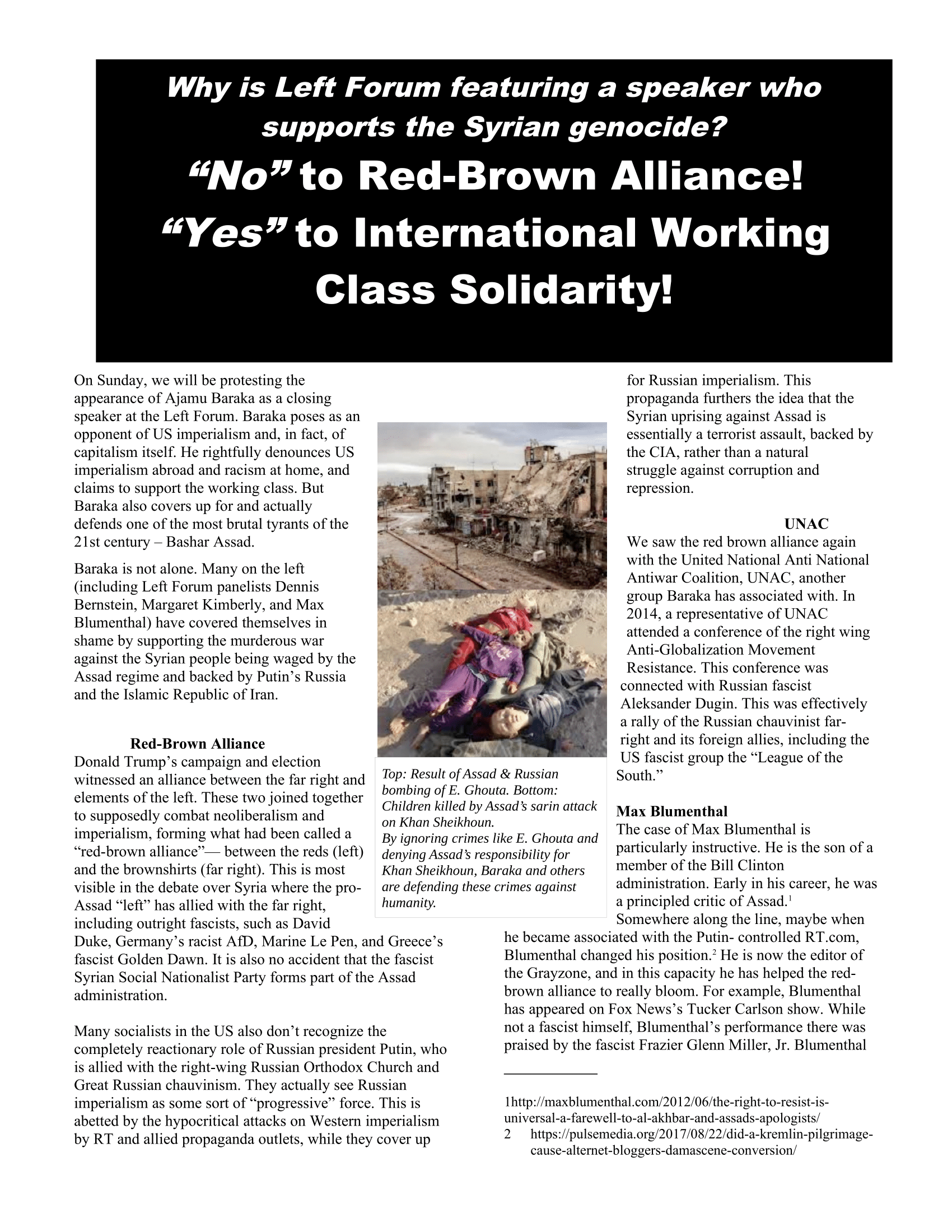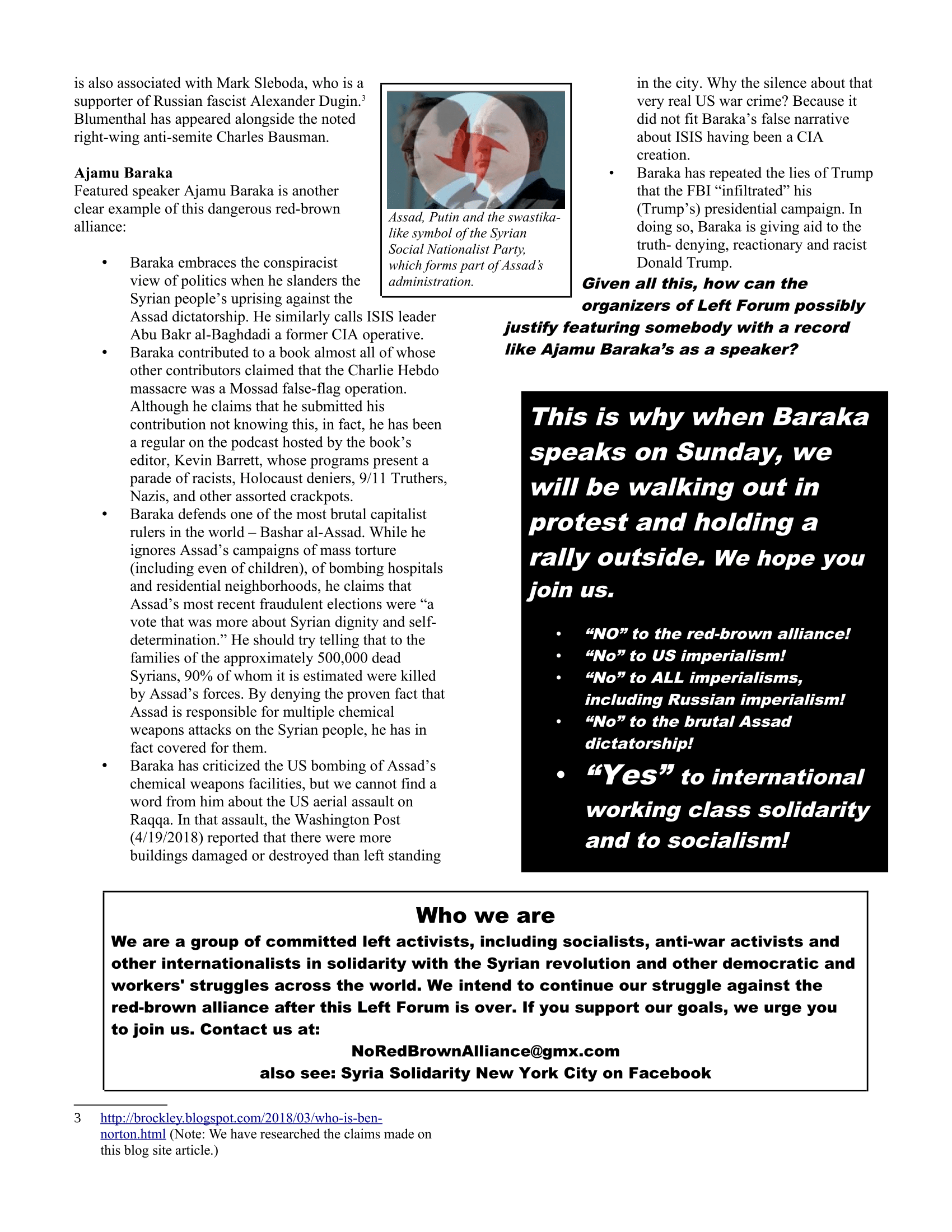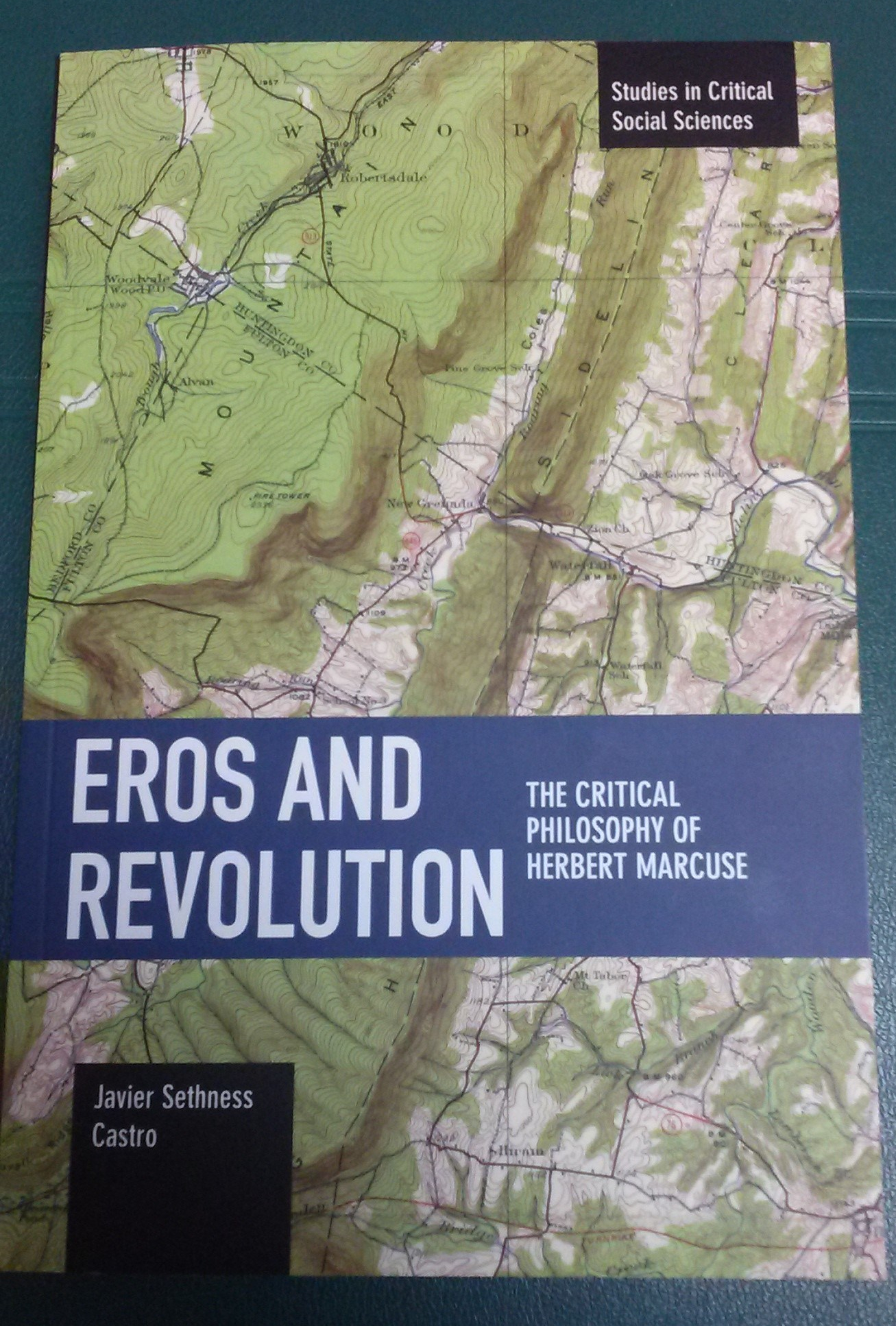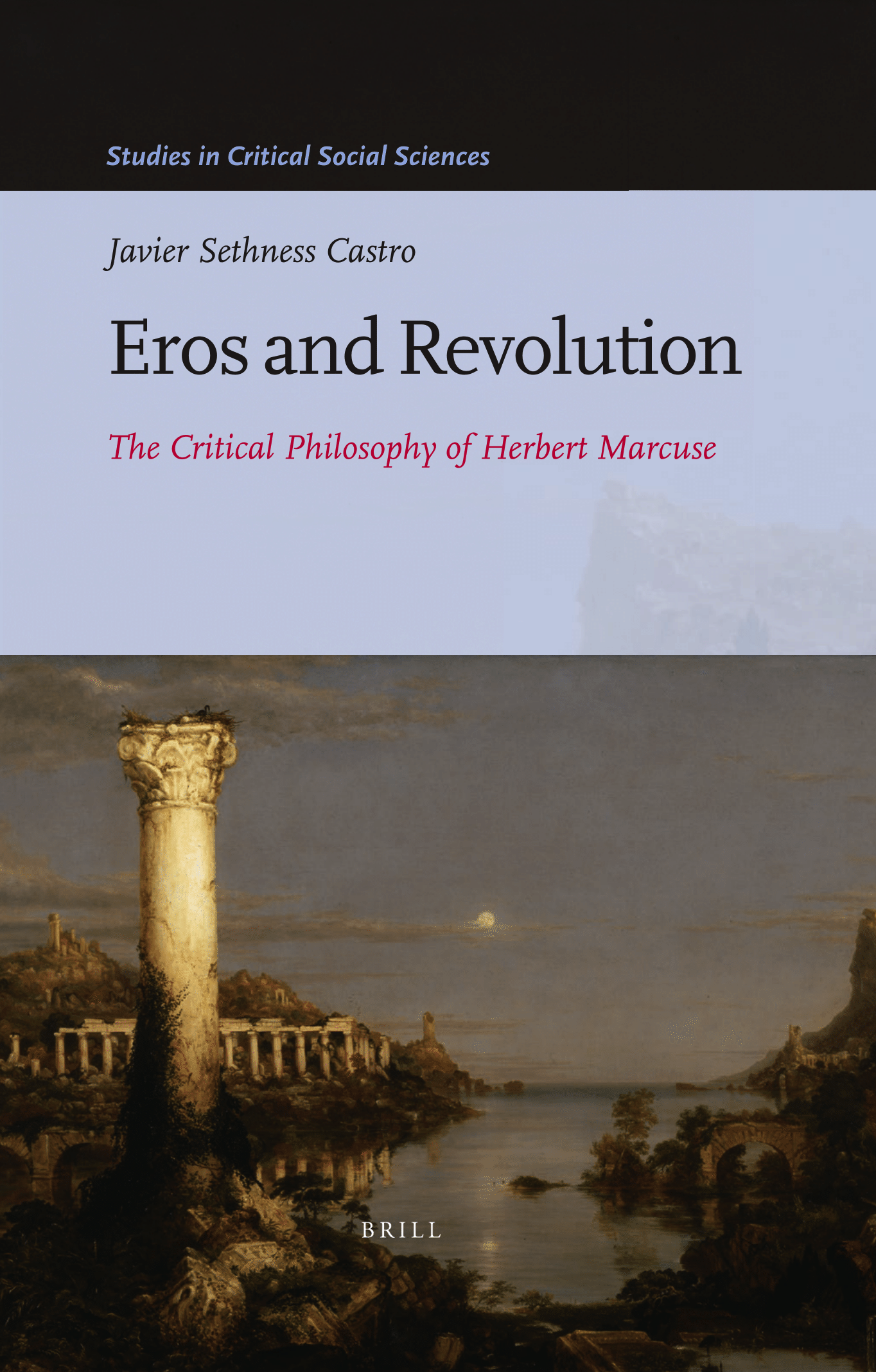
Please find below the partial transcript of the “Marxist-Anarchist Dialogue” that took place on February 12, 2017, at the Sepulveda Peace Center in Los Angeles.
I’d just like to begin with a quote from Bakunin in Statism and Anarchy (1873):
“To contend successfully with a military force which now respects nothing, is armed with the most terrible weapons of destruction, and is always ready to use them to wipe out not just houses and streets but entire cities with all their inhabitants—to contend with such a wild beast, one needs another beast, no less wild but more just: an organized uprising of the people, a social revolution […] which spares nothing and stops at nothing.”
As Ukrainian revolutionary Nester Mahkno and his comrades point out in their “Organizational Platform for a General Union of Anarchists,” written in exile in Paris in 1926, it was in the life of the toiling masses, particularly the Russian practices of mir, obshchina, and artel, or the agrarian commune and cooperative labor, that Alexander Herzen and Mikhail Bakunin discovered anarchism. Yet, as Paul McLaughlin (2002) observes, Bakunin’s anarchism is also one with his atheism and anti-theologism, or atheistic materialism. Bakunin (1814-1876) extends Ludwig Feuerbach’s exposé of the mystification of religious authority by illuminating the reification of political and scientific authority while summoning the negative Hegelian dialectic to sweep away feudalism, capitalism, despotism, and the State. Bakunin famously expounds on this view in “The Reaction in Germany” (1842), where he stipulates the existence of an “either-or” dialectic demanding the victory of either the Negative (Revolution) or the Positive (the State or the status quo). Yet instead of a battle between two opposing forces leading to a synthesis, as Hegel imagined, Bakunin envisions a dyadic conflict leading to the full victory of the Negative, yielding “democracy” in 1842, or “anarchy” 25 years later. Bakunin views history as a gradual evolutionary progression that contains episodes of revolutionary acceleration—hence his famous conclusion to “The Reaction,” where he professes his faith in the “eternal Spirit which destroys and annihilates only because it is the unfathomable and eternal source of all life. The passion for destruction is also a creative passion.”
For Bakunin, history progresses through the principle of revolt, which together with the principles of human animality and reason for him express the human essence; reason is the emancipatory force of history, as it illuminates freedom. Besides Herzen, the anarcho-Populist “father of Russian socialism” with whom Bakunin worked closely in favor of Polish independence from tsarism, developing the slogan “Zemlya i Volya” (“Land and Freedom”) as a summary of their visionary program that would resonate around the world (perhaps most famously, indeed, as Tierra y Libertad in the Mexican Revolution), his philosophical and political influences are many: there is Hegel; Feuerbach; Konstantin Aksakov, a notable anti-Statist figure within the Stankevich Circle in Moscow; Johann Fichte, from whom Bakunin took the emphasis on action and the vision of a conscious, collective movement striving to institute reason, freedom, and equality in history; Bruno Bauer, who sees in Hegel a radical critique of the State and religion; and Pierre-Joseph Proudhon, from whom Bakunin took anarchism and atheism. In stark contrast to Proudhon the sexist, however, Bakunin is a militant feminist who was called “Hermaphrodite man” by Marx in 1868 for demanding the “equalization of classes and individuals of both sexes” in the Program of the International Alliance for Socialist Democracy, or “the Alliance.” The roots linking Bakunin’s atheism or anti-theologism with anarchism were established by 1842, though Bakunin wasn’t explicitly anarchist until 1866, when he declared the goal of the International Brotherhood, forerunner of the Alliance, as being the “overthrow of all States and at the same time all […] official Churches, standing armies, centralized ministries, bureaucracy, governments, unitary parliaments and State universities and banks, as well as aristocratic and bourgeois monopolies.”
Now I’d like to come to some of the differences between Bakunin’s thought, or anarchism, and Marx and Marxism, and illuminate this through a few issues. For one, there is the matter of Prometheanism and productivism. Marxism has been accused for a very long time of being both: that is to say, that Marx and Marxism are obsessed with progress and the development of productive forces, equating human liberation with the domination of nature—despite the considerable efforts that have been made in recent decades by eco-Marxist to rescue Marx on these two grounds. So the question arises: is anarchism any better?
Bakunin adheres to naturalism, a post-Enlightenment philosophical movement associated with materialism and atheism, which lay the foundations for modern science while criticizing its excesses and abuses. As such, Bakunin takes aim at René Descartes and Immanuel Kant for their anthropocentrism. Therefore, Bakunin’s naturalism can be said to be associated with ecology. Indeed, it was through anarchism that Murray Bookchin developed the philosophy of social ecology decades before John Bellamy Foster and others “discovered” Marx’s questionable environmentalism. Bakunin considers Cartesian anthropocentrism to be anti-naturalist. For these reasons, naturalism arguably holds greater ecological potential than historical materialism.
Now, coming to the question of history, racism and imperialism, anarchists disagree, as McLaughlin notes, principally with Marxists over the usefulness of historical materialism and the stages theory of history, whereby history inevitably progresses from primitive communism to the slave societies of antiquity, feudalism, capitalism and then communism in the end.
Instead of the determinism set forth by Marx as early as 1847 in The Poverty of Philosophy, a volume that presents a devastating (if opportunistic) critique of Proudhon, where Marx argues that socialism can only be achieved after the full development of critique, Bakunin and the anarchists believe in spontaneity. Plus, anarchists do not consider the industrial proletariat necessarily to have more revolutionary potential than the peasantry, as Marxism does; instead, anarchists seek to unite both proletariat and peasantry against capitalism and the State.
To illustrate the difference between the two approaches, consider how Engels responded to Bakunin’s “Appeal to the Slavs,” which sought to mobilize the concepts of justice and humanity to unite the Slavs in a federated struggle against Russian and Austro-Hungarian imperialism in the wake of the failed 1848 Revolutions. In “Democratic Pan-Slavism,” Engels declares that, other than for the Poles and Russians, “no Slav people has a future” outside of subordination to centralizing Prussian and Austrian imperialist “civilization.” In addition, reflecting on the recent Mexican-American War, which had just ended that year, Engels trolls Bakunin, asking, “will [he] accuse the Americans of a ‘war of conquest,’ which […] was […] waged wholly and solely in the interest of civilization? Or is it perhaps unfortunate that splendid California has been taken away from the lazy Mexicans, who could not do anything with it?”
Bakunin was not dominated by the questionable reasoning that leads Marx and Engels to express uncritical opinions about capitalism and colonialism (per the stages theory). Instead, he espouses a decolonizing perspective that initially supported national-liberation struggles but then came to understand the need for coordinated global revolution—hence his popularity in the more agrarian Mediterranean and eastern European countries (Spain, France, Italy, Switzerland, Russia) within the International, as well as in India, Mexico, and much of the rest of Latin America after the First International. This is not to overlook Marx’s late revisions of his deterministic, callous reasoning, especially after his study of the Russian mir, nor is it to ignore the fact—as Kevin Anderson reminds us—that Marx was among the first Europeans to call for India’s independence from British domination!
There is also the issue of Marx’s own anti-Semitic comments against Ferdinand Lasalle and himself and his family, as in On the Jewish Question (1844), which nonetheless cannot compare to Bakunin’s far more wretched Jew-hatred, based on conspiracy and the “anti-Semitism of fools.”
Politically, Marxism and anarchism diverge principally on the questions of the State, religion, tactics, and strategy.
Robert Graham, author of We Do Not Fear Anarchy; We Invoke It, has identified 6 principles by which Bakunin distinguished anarchism from other approaches: anti-authoritarianism, anti-Statism, anti-parliamentarianism, federalism, libertarianism (that is to say, the consistency of means and ends), and social revolution as means to emancipation.
We see conflict with Marxism on all of these questions. But the primary contradiction is really between statism and centralism, which is on the Marxist side, and the anti-state or federalist position, which accords with anarchist principles.
So to illustrate the distinction, I just want to quote a couple of things by Marx and Engels. In their 1850 address of the Communist League, they argue that the German workers’ movement must strive for the “most determined centralization of power in the hands of the state authority. They must not allow themselves to be misguided by the democratic talk of freedom for the communities, of self-government, etc.” There’s also a letter that Engels sent to Carlo Cafiero, who was an Italian Alliance member, in 1872: “Bismarck and Victor Emmanuel had both rendered enormous service to the revolution by bringing about political centralization in their respective countries.”
And so, as an alternative, the International Alliance for Socialist Democracy (“the Alliance”) was a specifically anarchist organization through which Bakunin sought to deepen the revolutionary struggle of the International. The Alliance “stands for atheism, the abolition of cults and the replacement of faith by science, and divine by human justice.” In addition, it sought to collectivize means of production via the agricultural-industrial associations rather than through the State.
To conclude here, I want to illustrate this conflict very practically in a historical way by analyzing the conflict between Marx, Bakunin, and their followers in the First International, or the International Working Men’s Association (IWMA), which was founded in 1864. Their conflict really happened between 1868 and 1872. This conflict really revolves around the incompatibility of the anarchist and protosyndicalist emphasis on direct action with the Marxist electoralist or statist strategy.
And just as a background to this conflict, it bears mentioning that Marx and Engels slanderously accused Bakunin of being a tsarist agent, first in 1848. These charges were resurrected by Marx’s allies in Spain and Germany in the runs-up to the Basel (1869) and Hague (1872) Congresses of the International. In fact, curiously, this echoes the World Socialist’s Web Site’s denunciation of the Antifa protesters against Milo Yiannopoulos at UC Berkeley, condemning them as agents provocateurs.
So, just to go briefly around some of the highlights of the International and its Congresses: at the Brussels Congress of 1868, the Belgian federalists introduced a principle whereby European workers would launch a general strike in order to either prevent or respond to the declaration of war in Europe, whereas at the Basel Congress of 1869, the IWMA’s “most representative congress” (Graham), the IWMA’s majority voted in favor of revolutionary syndicalism as the preferred strategy for the International. In Basel, the Belgian internationalists argued for each local of IWMA to become a commune or “society of resistance” (a union), whereas Bakunin and other federalists were hailing collectivism in the form of cooperatives, mutual aid societies, credit unions, and the tactic of the general strike.
Then, of course, the Paris Commune of 1871 showed the brutality of counter-insurgent suppression and demonstrated Proudhon’s error, in fact, in believing that the transition to socialism or anarchism could come about peacefully. And during this time, Marx and Bakunin more or less did converge for a short time in their analysis of the Commune. Karl Marx believed that the experience of the Commune demonstrated that the workers cannot “simply lay hold of the ready-made state machinery and wield it for their own purposes.” However, at the London Conference of 1871, Marx tried to reverse the Basel Conference consensus by imposing an electoral strategy through the General Council, despite the fact that the majority of the International did not agree. Marx was actually prepared to ally with the Blanquists to do this. And thereafter, at the next Congress in the Hague (1872), Bakunin and his Swiss assistant James Guillaume were expelled from the International so as to uphold the London precedent on parliamentarianism, and the General Council was transferred to New York—leading the Blanquists who in fact had allied with Marx to have this done to resign from the International.
In this way, the First International was reduced from being a multi-tendency platform to an exclusively statist one, and then reconstituted as the Second International in 1889. From 1896 on, the Second International excluded anarchists altogether for not agreeing with the same electoral strategy.
However, the anarchists did go off in 1872 right after the expulsion of Bakunin and Guillaume and founded their own Congress in St. Imier, Switzerland, where they had a series of different conferences that led to the creation of a rather significant anti-authoritarian, anarchist international movement that reaffirmed syndicalism and the social revolution. This gave way to the dominance of anarcho-syndicalism within the international labor movement from the time of the Second International up to World War I.
And so I just want to conclude here, because we are talking about the time now being under Trump, and I want to share some of the continuities between the history and theory that I’ve been telling you about and what Black Rose/Rosa Negra tries to glean from that in the current moment. While we haven’t discussed this very profoundly, we can glean some points from the statements that we have published:
We must actively shut down fascists as we saw happen at UC Berkeley with Milo and in opposition to people like Richard Spencer and so on.
We should also be engaging with people who are becoming increasingly mobilized recently. Rather than be dismissive of them, we should be building popular power, and we should be coordinating with other revolutionary groups.
We also reaffirm Bakunin’s idea of anti-electoralism. We believe that the struggle against Trump and Trumpism should not bring us closer to the Democrats but rather to the social revolution, and we think specifically that we should be organizing and participating in revolutionary social movements, such as the asambleas populares or popular assemblies that have been sprouting up around the city and around the country. In fact, some of our comrades are involved in these asambleas, which are trying to bring together resistance to the deportations with building popular power through the theory of libertarian municipalism or communalism, which are more or less anarchist ideas.
Then there’s also of course the Standing Rock struggle, which is a great challenge to Indigenous autonomy and also ecology.
And we also have the question of feminism as our comrades have written recently in an analysis of the current moment with regard to feminism: in fact, they are saying that the Women’s March represents an opening for revolutionary materialist class struggle feminism to gain some ground.
There’s also the antimilitarist and syndicalist struggle for workplace autonomy as well as the general strike. There’s a very recent piece by the Shutdown Collective published on Truthout about the general strike which I recommend highly.
Furthermore and lastly, we are trying to expand our presence geographically and engage with the white working class, which we understand as having been a very clear contributing factor to the current situation we have with Donald Trump as our president. Thank you very much for listening.
Internal Panel Discussion
Thank you, [anonymous Marxist]. I think you began by saying that anarchism is seen on the streets but not on the home or workplace. And I mean, as I was mentioning in my presentation, with regard to the Basel Conference and protosyndicalism, the entire opposition between the Marxists and anarchists in the original break within the First International is very much about that question—anarchism being in the workplace—and Marx and Engels’s centralist opposition to this due to their interest in presenting a statist or electoral strategy.
Also, I don’t think it’s true that anarchism isn’t found in the home, either. Bakunin had a very militant feminist critique of the Russian Commune and of society in general; it wasn’t just his opposition to capitalism and the State. I push back on that.
I think I understand what you mean by the Marxist critique of anarchists—that they have an abstract conception of liberty—but I don’t think it’s very abstract at all. I mean, if you look again at the history I was just retelling about the struggles that anarchists have been involved with, both at the individual and collective level, there’s nothing abstract about it. So I’m a little puzzled what you meant by that. I would just comment to say that it did remind me a bit of Engels’s critique of utopian socialism, saying that only scientific socialism has the correct insight, and that all the other schools that are revolutionary and socialist in fact are nothing.
And then your comments about Antifa are interesting. I completely disagree that Antifa has “empty content”! I think that that was completely contradicted by what we saw at UC Berkeley. This was a neo-Nazi agitator and a Trump agitator who was planning on publicly outing trans* and undocumented students at UC Berkeley, and that was shut down by the coordinated action of anarchists and Antifa. I don’t think there is anything empty about that at all.
Nor do I think that anarchists lack future vision. As I was saying of Bakunin, anarchism is all about the liberation of humanity. There is nothing… It’s not a present-oriented type of thing; it’s not lacking a future vision in any sense.
You know, there is a lot of debate among anarchists about what is the meaning of anarchism, with regard to the variety or heterogeneity which you pointed to in terms of the development within anarchism. You cited “anti-civilizational” anarchism as an example. There is some debate regarding the question of whether that can even be considered a form of anarchism. I personally would say that it’s not a form of anarchism: it’s actually not interested in abolishing hierarchies, but more simply interested in abolishing technology, agriculture, and things like that. That’s not very much consistent with the anti-statist and anti-hierarchical critique that anarchism brings about. In fact, I think it’s very important not to reduce the anarchist or green or eco-anarchist position to that; that’s very reductive. There is Murray Bookchin’s philosophy of social ecology, which is a very profound, rich, Hegelian tradition that develops the critique of the destruction and domination of nature with the critique of social domination as well.
And the last thing: toward the end of your comments, you suggested that anarchists deny that humans are dependent on each other, but that is completely false. If you look at Peter Kropotkin, he theorized the idea of mutual aid being a major factor of evolution, both within the animal world as well as in social evolution. His entire volume is dedicated to that. He studied biology in Siberia for a great number of years. […]
I think to some degree within the socialist tradition, with its anarchist, Marxist, and other wings, there is a lot of miscommunication and so on. So I think that what you are suggesting about the science of society being before the revolution is actually very consistent with the naturalistic approach that I was mentioning to you about Bakunin and the way you have to certainly analyze society first, and nature first—nature first, then society—and from there you progress to critique and action. […]
Actually, within the debate or the conflict between Marx and Bakunin or Marxism and anarchism within the First International, there was a back-and-forth about this very same question [Marxism as a statist form of capitalism]. And you know, I did mean to get to a discussion of the Russian Revolution, but there was no time. There is certainly an anarchist tradition from the time of the conflict in the First International as well as during and after the Russian Revolution that did identify the Bolsheviks, even before Stalin, as State capitalists, according to what Lenin was writing—advocating for the creation of State capitalism as a transitional strategy in Russia. Bakunin very clearly identified that even if you had a statist power that was proclaiming itself as anti-capitalist, it would be composed of a small elite, as all States are, and would necessarily be reproducing these systems of domination of hierarchical authority. Bakunin was very visionary in this sense; he very much anticipated what happened in Russia.











